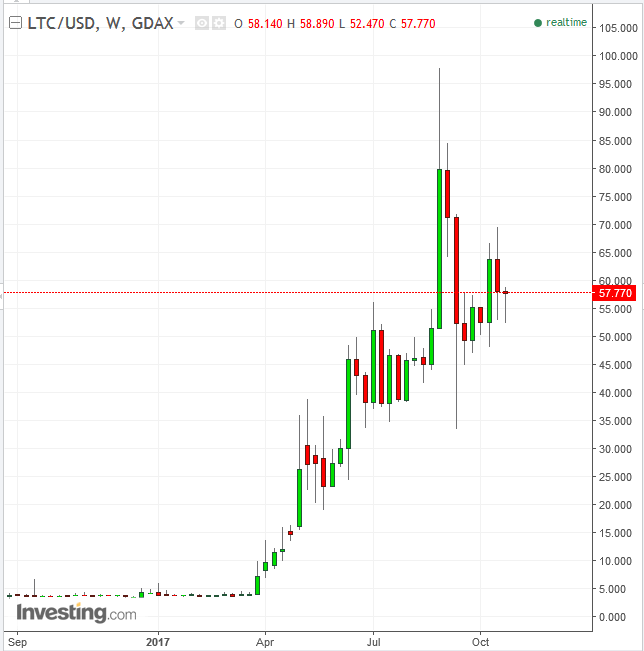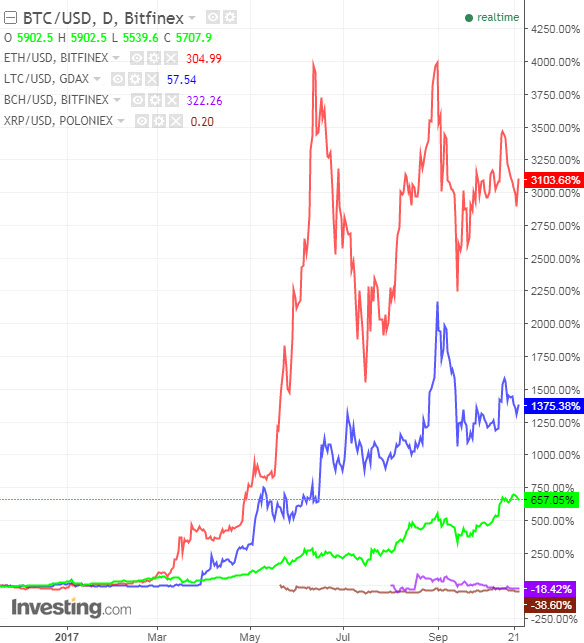by Tanzeel Akhtar
Litecoin (LTC) was created by Charlie Lee on October 2011. Litecoin's market cap is now at $2.8 billion, trading at $57.5.

Originally launched by combining bitcoin code with a debugged version of a failed alt-coin called Fairbrix, Litecoin was "designed to make mining more democratic" than for Bitcoin. After its launch, Litecoin became the second most popular digital currency behind Bitcoin, with a similar bullish price trajectory.
However, a variety of missteps, including a Chinese Litecoin ponzi scheme in 2015 undermined LTC acceptance and the digital currency entered a bear market which diminished its position within the cryptocurrency environment.

Currently, Bitcoin (BTC) remains in the lead and at the forefront of cryptocurrency adaption, with a market cap of $95.5 billion, trading at $5,698 at time of writing. Ethereum, Ripple, and Bitcoin Cash follow closely behind Bitcoin. Litecoin trails, having dropped down to fifth position.
Bitcoin and Litecoin still closely connected
Despite the fall to fifth position, many continue to believe Litecoin is the second most relevant cryptocurrency. In years past Litecoin was dubbed the silver to Bitcoin's gold standard. Does that analogy still apply?
Vitaly Gumirovm, the CEO of blockchain chat solution Miniapps.pro explains that both Bitcoin and Litecoin remain closely connected to each other because they are built on similar algorithms. But there has been a divergence in Litecoin's market positioning. He says:
“Litecoin historically occurred as a result of [the] Bitcoin hard fork in 2012. It was cryptocurrency number two for a long time in terms of value and trading volume, you could say it was silver compared to Bitcoin gold in the past. Its exchange rate is highly correlated with Bitcoin even now. However, it left its position to Ethereum now.”
Greg Cipolaro, senior analyst at Digital Asset Research isn't necessarily convinced that Litecoin has become a cryptocurrency laggard. He notes that Bitcoin and Litecoin share many characteristics but differ in consensus algorithms, block creation time, and transaction confirmation times, which could bode well for future uptake. Explains Cipolaro:
“Litecoin’s block creation time of 2.5 minutes, versus 10 minutes for Bitcoin, allows for faster verification of transactions. It was also one of the first large-cap tokens to adopt Segregated Witness (SegWit), a technology that optimizes data storage within a block, which paves the way for increased transaction throughput. Bitcoin surpasses Litecoin in terms of developer engagement (i.e. GitHub statistics) network security (i.e. blockchain difficulty) and merchant acceptance.”
Trevor Koverko CEO of Polymath, a securities token platform, believes that Litecoin serves as a useful counterpart to Bitcoin just as silver does to gold. He points out that Litecoin is faster than Bitcoin and more agile because its corporate governance structure allows it to try new things and experiment more quickly. In that sense, Litecoin is like a 'Petri dish’ for the more popular Bitcoin, or to use a sports analogy, it's the ‘minor league’ farm team for the Bitcoin blockchain, where new ideas and tech improvements can be tested before being implemented by Bitcoin.
Gold, Silver And...Copper?
Nolan Bauerle, director of research at analysis firm CoinDesk, isn't convinced silver is the right analogy. He believes that’s one way to view it, but many other alt-coins could also fit that description. Many aim to be used as a medium of exchange and to help create and secure commercial relationships.
Bauerle sees it a bit differently:
“Perhaps a more interesting analogy is to see Ethereum as digital copper, as in the massive development community building on it helps the cryptocurrency’s value rise as it becomes more useful in commercial and industrial applications.”
Another source we spoke to said Litecoin is the bronze to Bitcoin's gold and Ethereum is silver.
Does this all mean that Litecoin is destined to sink into obscurity as Bitcoin, Ethereum and other digital competitors take off? Clem Chambers, CEO and founder of data provider ADVFN thinks cryptocoins might be like Dotcom companies. Some unpredictably bloomed while others withered. Ultimately only a few became giants. But Chambers believes in Litecoin. In fact, he owns 'a pile' of the cryptocurrency, on the basis that it is indeed still silver to Bitcoin’s gold.
Of course, not everyone agrees. Is it possible Litecoin's designers mean it to be more like copper—highly utilitarian but in third place behind more precious metals such as gold or silver? Coinbase, the digital asset exchange market leader, offers only three coins: Bitcoin, Ethereum and Litecoin.
Here's how Chambers calculates the positioning:
“By weight, here is the rough ratio the Romans used: One gold to 12 silver and one gold to 500 copper. That morphed over the centuries to be one gold to 20 silver and one gold to 400 copper by World War I. The ratios of precious metal coins are evocative and the reasons are also similar. Cryptocurrencies are priced as a function of desirability and cost of mining.
“For Bitcoin this is especially true as it can be viewed that Bitcoin’s value is set by the profit and cost from its mining and maintenance. Bitcoin’s cost of transaction hovers around $2-$5 meaning it, like gold, can only be cost-effectively used for big transactions in the thousands of dollars range. Litecoin’s transaction cost is around 1c. This is a 1 to 500 ratio with Bitcoin, which again would suggest Litecoin is copper. Yet the map is not the territory.”
Precious metals analogy doesn’t hold
Aaron Lasher, chief marketing officer at Bitcoin portfolio provider Bread Wallet, completely disagrees with the analogy. In his view, silver is second to gold because it has a lower price-to-weight ratio, meaning that it is more convenient for the purchase of small ticket items. As Lasher explains it:
“For example, a $4 Starbucks latte would be a quarter ounce of silver (a little larger than a US 25-cent coin). Comparatively, you'd have to part with 0.003 (three thousandths) ounces of gold. That's such a tiny sliver that you're likely to lose it, or overpay for your coffee by accident.”
Using Lasher's comparison, because Litecoin and Bitcoin are both weightless, their price-to-weight ratios are equivalent so the analogy doesn't apply. Then what makes Litecoin attractive? "Mainly as a backup to Bitcoin and test-ground for new improvements," he says. "It's much less risky to experiment with Litecoin than it is with Bitcoin, and consensus to do so is easier to achieve.”
The cryptocurrency market continues to evolve and develop at remarkably rapid pace. Though some suspect that Litecoin could become less popular in the future, others believe it's merely been in 'hibernation.' They cite developments such as Charlie Lee's recent decision to make Litecoin his main project once again, and digital wallet Jaxx integrating Litecoin in all of the platforms it supports including iOS devices, as signs that things are picking up. As CryptoInsider recently said, Litecoin could be headed for a new growth spurt.
